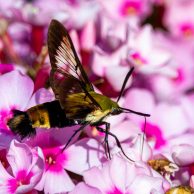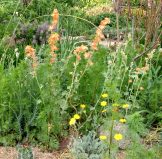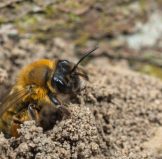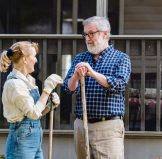 We’re celebrating all month, and we’d love to encourage you to support pollinators in your gardens.
We’re celebrating all month, and we’d love to encourage you to support pollinators in your gardens.
Pollinator Month is a special time for Harlequin’s Gardens – a time when we celebrate the hard work of bees (honeybees, solitary bees, bumblebees) wasps, ants, flies and bee flies, butterflies and moths, beetles, some bats and birds, and some mammals. They’re all around us, connecting the dots between flowers and food.
Come check out our special pollinator display, which is our whole facility! The descriptive signage on most of our plants is marked with bee, hummingbird, and butterfly icons, and you might notice that almost everything is important to bees, of which we have over 500 species here in Boulder County alone. Even our native bunch grasses can provide nesting sites for bumblebees in the dried leaves at the bottom.
Did you know?
According to This Week in Water, there are about 400,000 species of beetles in the world, making them among the largest group ofanimals on the planet. And the vast majority of beetles are weevils—an insect many consider to be a pest for sometimes munching on pasta and grains in our pantries, and sometimes on the plants in our gardens. And, of course, there are boll weevils, which gained notoriety starting in the late 1800s for devastating cotton crops in the American South. In the early 1970s, about one-third of all pesticides applied in the United States targeted boll weevils. You may see these pollinators on strawberry or grape plants here in Colorado.
The best ways to help pollinators are:
 1. PROVIDE SAFE FORAGE. First, at Harlequin’s Gardens our plants are all neonicotinoid-free. Neonicotinoids are widely-used systemic insecticides that circulate through the entire plant, including nectar and pollen, which are collected by bees for food. Bees, with their fuzzy bodies and need for pollen for their baby food are the best pollinators. Neonicotinoids are nerve toxins to which bees are very sensitive, and are implicated in Honeybee Colony Collapse. If you don’t know whether harmful pesticides have been applied, you don’t know whether your plants are safe from pollinators.
1. PROVIDE SAFE FORAGE. First, at Harlequin’s Gardens our plants are all neonicotinoid-free. Neonicotinoids are widely-used systemic insecticides that circulate through the entire plant, including nectar and pollen, which are collected by bees for food. Bees, with their fuzzy bodies and need for pollen for their baby food are the best pollinators. Neonicotinoids are nerve toxins to which bees are very sensitive, and are implicated in Honeybee Colony Collapse. If you don’t know whether harmful pesticides have been applied, you don’t know whether your plants are safe from pollinators.

2. STOP USING PESTICIDES, especially insecticides and fungicides. This doesn’t mean that your plants have to look scraggly; Harlequin’s has non-toxic pest-management alternatives and alternative plants that are less prone to pest problems. If you use a lawn care company, chat with them about what they’re using and ask them to use only non-toxic products on your property.
3. PROVIDE SAFE HABITAT. This includes not only safe, pesticide-free plants that keep your garden blooming all season, but nesting habitat as well. About 75% of our native bees live in the ground in plain-old Colorado dirt. Leave some small areas bare and un-mulched for them. or the remaining cavity nesters, we have clean culture materials like replaceable tube liners for (next year’s) mason bees and variety packs for other species.

4. ENCOURAGE OTHERS TO DO THE SAME. This includes your neighbors, HOAs, City and County lands, roadsides, and right of ways. We have pollinator plant lists you can show others to give them ideas.
Our plants are adapted to our local environment. This means that they’re ‘happier’ here and require less chemical and water input. We carry many plants from ground covers to trees, among them Nepeta (catmint) and Helianthus (sunflower), that will provide for pollinators in general, as well as some plants visited by bee specialists, for example Sphaeralcea (mallow) and Oenothera (evening primrose). Even our own-root roses, selected for our climate and soils, are good for pollinators. As a rule of thumb, if you can see the stamens, so can the bees.
Ask for our pollinator plant lists to help you shop, or prepare in advance by viewing these plant lists, Plants to Support Pollinators (Honeybees, Wild Bees, Butterflies, etc.) and Plants for Pollinators.

OTHER RESOSURCES INCLUDE:
- Pollinator Partnership
- Xerces Society
- USDA Utah Pollinating Insects Lab
- Project Apis m.
- Rewilding: Pollinator Pathways
NATIVE BEES
Honeybees aren’t practical for everyone, but our native, mostly solitary bees did ALL the bee-pollinating in the Americas before the introduction of honeybees from Europe in the 1600s. They love our weather, soils, and native plants. And we love them! We offer a selection of products to help you culture some of these gentle hole nesting bees where you live, including mason bees and leafcutter bees. Did you know that re-using old nesting tubes or blocks drilled with holes can promote diseases and parasites? We’ve partnered with Crown Bees to bring you responsible, sustainable, clean culture methods, based on the needs of the bees.
Here’s a sample of the items we’re offering.
 Native Bee Chalet and Stations
Native Bee Chalet and Stations
For placing nesting tubes for the current season and an attic for placing the previous season’s bees to emerge in the current season.
See more ways to celebrate Pollinator Month!
